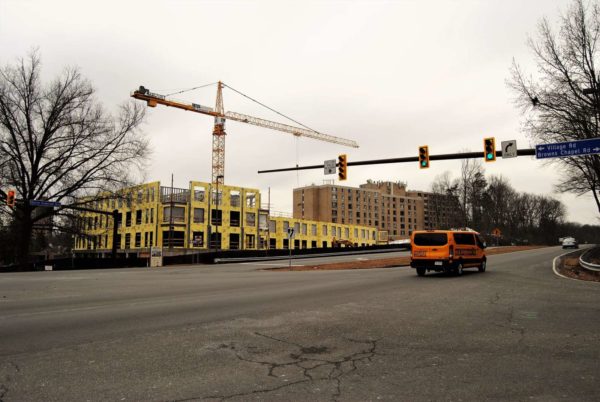Metro Reports Pandemic Ridership High for Fourth of July — “The transit agency said it saw a pandemic-record high ridership during the [Independence Day] holiday. As of 10 p.m. Sunday, about 174,000 trips were taken on the rail system, Metro tweeted Sunday night. That’s the highest single-day ridership since the beginning of the coronavirus pandemic.” [WTOP]
Man Arrested for Attempted Robbery in Reston — “Officers from the Reston District Station of the Fairfax County Police arrested a Centreville man Thursday [July 1] in connection with an attempted robbery in Reston…The victim returned to his car, which was parked near the intersection of Clubhouse Road and North Shore Drive around 4:53 a.m., when he found a man rummaging around inside it, police say.” [Patch]
Leidos Offers Employees a Year’s Pay to Get COVID-19 Vaccine — In an effort to counter slowing inoculation rates, the Reston-based information technology contractor has set aside $1 million to give 10 randomly selected employees a year’s worth of pay if they get the COVID-19 vaccine. Eight Leidos workers have died from the virus, including one D.C. area resident. [The Washington Post]
Virginia’s Death Row Officially Vacant — “With the death penalty formally abolished in Virginia as of this week, death row is now officially vacant, according to prison officials. Department of Corrections spokeswoman Lisa Kinney said the two remaining prisoners facing death sentences were moved off death row after the legislation was signed earlier this year.” [Virginia Mercury]

This is an opinion column by Del. Ken Plum (D), who represents Reston in Virginia’s House of Delegates. It does not reflect the opinion of Reston Now.
Virginia made history last week: The Governor of Virginia Ralph Northam signed the bill that made Virginia the first state in the south and the 23rd state in the nation to end the death penalty! I made the nearly four-hour trip to the Greenville Correctional Center in Jarrett where the “death chamber” is located to be at this momentous occasion when another of my legislative goals was realized.
While some have justified the death penalty as an appropriate “eye for an eye” punishment and a deterrent for other crimes, the history of the death penalty is much more complex. Virginia executed more people than any other state having executed 1,390 people over its 413 years. Its uneven application among the states and within the state itself is astounding. Virginia executed 94 women over its history, twice as many as the state with the next most executions of women. Of those, 78 were Black, 11 were White and five were of unknown race. Sixteen children below the age of 18 were executed including a slave girl about 12 years old who was hung in 1825. In 2005 the United States Supreme Court declared that the execution of those under the age of 18 at the time of their crime was cruel and unusual punishment and hence unconstitutional. It followed an earlier decision in a Virginia case that found that executing an intellectually disabled person as the state was poised to do was unconstitutional.
Until the first electrocution in 1908, executions in Virginia were carried out by hanging making them not unlike the lynchings of Blacks that had occurred throughout the South. From 1900 until the U.S. Supreme Court declared the death penalty unconstitutional in 1977 for crimes in which no one was killed, Virginia executed 73 Black defendants for rape, or attempted or armed robbery that did not result in death, while no White defendants were executed for those crimes.
Other numbers show how the death penalty was more an act of White supremacy than for public safety. Between 1900 and 1999, there were 377 executions and of those 296 were Black persons and 79 White persons. For murder there were 304 executions, 223 Black and 79 White persons. For rape 48 Black persons and for attempted rape 20 Black persons executed, and in both instances no White persons were executed.
One of the most unbelievable stories in the history of the death penalty in Virginia was the execution of five Black defendants on February 2, 1951, and the execution of two more Black men on February 5, 1951, accused of raping a White woman. An all-White jury meted out the punishment after trials that lasted one day per defendant.
We cannot rewrite this dark chapter of Virginia’s history, but we must learn from it. Too many laws in the past were written to maintain White supremacy rather than protect the public equally. The General Assembly has made major strides at ridding the Code of Jim Crow laws. We can see the repeal of the death penalty as a major step in moving Virginia forward as a more just state.
Wind Advisory In Effect — The National Weather Service has issued a wind advisory that will be in effect from 2-6 p.m. today. [NWS]
Metro Seeks Comment on Proposed Budget — Metro is seeking the public’s feedback on its budget, which faces a significant shortfall due to a decrease in ridership caused by the pandemic. Ridership is down about 90 percent on Metrorail. [Washington Metropolitan Area Transit Authority]
Reston Association Committee to Host First Public Forum — The organization’s multimodal transportation advisory committee is hosting its first public forum of this year on March 11. The committee seeks input on sidewalks, trails, pathways, crosswalks, and the overall pedestrian experience in Reston. [RA]
Death Penalty Repeal Sent to State Governor — Virginia could become the first state in the South to end the death penalty. The legislation was passed on Monday by state lawmakers and now heads to the desk of Gov. Ralph Northam. Virginia has executed more people in its history than any other state. [Reston Patch]
Photo via vantagehill/Flickr
 This is an opinion column by Del. Ken Plum (D), who represents Reston in Virginia’s House of Delegates. It does not reflect the opinion of Reston Now.
This is an opinion column by Del. Ken Plum (D), who represents Reston in Virginia’s House of Delegates. It does not reflect the opinion of Reston Now.
Under current Virginia law a person who steals something of value less than $1,000 can be punished by up to 12 months in jail with fines up to $2,500 along with any restitution that might be owed. As tough as that sentence may seem, if that same person commits another misdemeanor larceny of whatever amount less than a thousand dollars within any time frame in the future, that person under current law can be jailed for between 30 days and 12 months. A third or any subsequent offense at any time in the future results in a Class 6 felony with up to five years in prison.
Persons who practice law defending individuals facing such charges tell me that the accused are most likely to be poor, and the vast majority are homeless and/or mentally ill. Upping the penalties on such persons is neither just for the vulnerable persons involved nor does it make society any safer. With thanks to Justice Forward of Virginia (justiceforwardva.com) for bringing my attention to this injustice, I introduced HB2290 that is now making its way through the House to repeal the enhanced penalties.
This bill is but one example of laws that have been on the books for years but upon examination are clearly not just laws; they do not agree with what is considered morally right or good. For most of the years I have served in the House of Delegates, I was the lone vote against a series of bills that added to the list of capital crimes. Along the way conservative Republican Frank Hargrove of Hanover County joined me in my opposition to the death penalty. In more recent years, opposition to the death penalty has grown to the point where it appears likely that the death penalty will be abolished this year by a bill of which I am a co-patron.
Abolishing the death penalty would help put just into the justice system in the Commonwealth. Between 1901 and 1981, 258 Black people were executed in Virginia at a rate nearly six times the rate of white people. Not a single white person was executed for any crime other than murder while Black persons were executed for crimes that included armed robbery and attempted sexual assault. During its history stretching back to 1608, Virginia put to death 1,300 people including the most women and young children of any state in the Union.
This legislative session may be the most historic yet in reforming the criminal justice system. Bills pending before the current session include repealing mandatory minimum sentencing, ending felony possession for drugs, reforming the broken probation system, instituting automatic expungement of criminal records, establishing pay parity for public defenders, and ending presumption against bail.
Virginians will be no less safe in their person or in their possessions when the laws become more just, fair and equally applied regardless of one’s race. Laws that are just are more likely to be respected and certainly easier to defend.
Update, 7 p.m. Thursday: The temporary order has been lifted and the execution will likely take place at 9 p.m. Thursday.
Update, 4:30 p.m. Thursday: Late Wednesday afternoon, a federal judge in Alexandria issued a temporary restraining order on Virginia carrying out the execution, which was scheduled to take place at 9 p.m. Thursday.
At issue is the supplier of the drugs for the scheduled lethal injection.
Original story, 9 a.m. Thursday: Alfredo Prieto, convicted in 2010 for a rape and double homicide near Reston, is scheduled to be put to death on Thursday after Gov. Terry McAuliffe denied a stay of execution earlier this week.
“After a thorough review of the facts of this case, the actions of the various federal and state courts, and the petitions and recommendations of individuals representing both Mr. Prieto and the families of his victims, I have decided not to intervene in this execution,” McAullife said in a statement. “Mr. Prieto was convicted in a fair and impartial trial, and a jury sentenced him to death in accordance with Virginia law. Federal and state appellate courts have extensively reviewed his case and denied his requested relief.”
Prieto, now 49, was sentenced to two death sentences in December 2010 for the murders of Rachael Raver and Warren H. Fulton III, both 22. The couple was murdered in 1988 on a vacant lot off Hunter Mill Road. Raver was a recent graduate of George Washington University, and Fulton played on GW’s baseball team.
Evidence of a Prieto’s involvement in a third slaying, in Arlington in May 1988, was also presented to the jury during its sentencing phases.
Prieto may be responsible for nine killings between 1988 and 1990, when he was arrested in Ontario, Calif., for the rape and murder of 15-year-old Yvette Woodruff., authorities said. Prieto was sentenced to death in the Woodruff case in 1992, but his California appeals continue.
Prieto was linked by DNA to the Hunter Mill and Arlington murders in 2005. Authorities extradited him from California for trials here.
Prieto’s was first tried in Fairfax in 2007, where a jury rejected his defense attorney’s claims his IQ met the standard for mental retardation defense and convicted Prieto of capital murder and rape. But a juror refused to continue deliberating during sentencing and a mistrial was declared.
Prieto was tried again in 2008. The jury again rejected the retardation defense, convicted Prieto and voted for two death sentences. However, the sentences were reversed on appeal.
The third trial, for sentencing only, was held in 2010. The jury voted for two death sentences. The most recent appeal was rejected earlier this year.
Added McAullife: “It is the Governor’s responsibility to ensure that the laws of the Commonwealth are properly carried out unless circumstances merit a stay or commutation of the sentence. After extensive review and deliberation, I have found no such circumstances, and have thus decided that this execution will move forward.”
“I will continue to pray for all of the individuals and families affected by these tragic and horrible crimes.”
Prieto is the first Virginia prisoner to be executed since January 2013.




